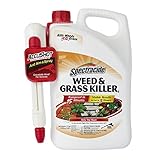Weeds can be a real headache, spreading fast, crowding out your favorite plants, and messing up your lawn or garden's vibe. That’s where weed killers step in—they’re your go-to solution for wiping out weeds and keeping them from making a comeback.
When picking the right weed killer, start by figuring out what you’re up against. Some products are made for specific weeds, while others handle a bit of everything. Also, think about the size of the area you’re treating and whether the product is safe for pets and kids. Always check the label and follow the instructions to stay on the safe side.
Best Weed Killers
After putting a bunch of weed killers to the test, we’ve found the best ones out there. Whether you’re dealing with stubborn weeds in your lawn, garden, or driveway, our top picks are easy to use, super effective, and safe for your family and the environment.
1. Ortho GroundClear Year Long Vegetation Killer1
You should get your hands on the Ortho GroundClear Year Long Vegetation Killer1. It is for anyone looking for a powerful weed killer that will keep weeds at bay for up to a year.
We recently used the Ortho GroundClear Year Long Vegetation Killer1 on our driveway, sidewalks, and gravel areas, and we were impressed with how quickly it started working. Within hours, we could see the weeds starting to wilt and die. After a few days, they were completely dead, and we haven’t seen any new growth since.
One thing to keep in mind is that you’ll need to use a tank sprayer to apply this product, and you’ll need to mix it with water before use. The instructions recommend using 10% concentrate, but we found that mixing it at a 25% concentrate to 75% water ratio was more effective. Just be prepared to mix it with water and use a tank sprayer for best results.
Pros
Cons
2. Spectracide Weed and Grass Killer
If you’re tackling weeds and grass, we recommend giving the Spectracide Weed and Grass Killer a try.
We had a great experience with it—the Accushot Sprayer was super easy to use, letting us target exactly where we wanted the product. We saw visible results in just 3 hours, and the rainfast feature was a bonus since it held up even after 15 minutes of rain.
That said, the sprayer didn’t work perfectly right out of the box for us, and a few tougher weeds took a couple of days to fully die off. Plus, the effects might not last as long as some other options.
Pros
Cons
3. Hi-Yield Weed Killer
If you’re dealing with grasses, broadleaf weeds, or woody brush, we think the Hi-Yield Weed Killer is a solid pick.
We gave it a try on our property and saw great results—within just a few days, there was a noticeable drop in weeds and unwanted grasses. Its double-surfactant formula works fast and effectively, making it perfect for quick weed control.
What really stood out to us was the coverage. One bottle treated a large area, which saved us both time and money. The liquid concentrate was easy to mix and apply, and the clear instructions made the whole process a breeze.
That said, it’s not ideal for lawns, and you’ll need a sprayer for application, so it might not suit everyone’s preferences.
Pros
Cons
4. Ortho GroundClear Weed & Grass Killer
We gave Ortho GroundClear Weed & Grass Killer a shot in our landscape beds and were impressed—visible results showed up in just 15 minutes! Plus, it’s OMRI-listed for organic gardening, which makes it a great pick for anyone who values eco-friendly options. We also loved that it becomes rainproof in just two hours, perfect for areas with unpredictable weather.
That said, some tougher weeds needed a few rounds of treatment to fully disappear. We also had to be extra careful applying it to avoid damaging nearby plants, and the strong chemical smell means it’s best to use in a well-ventilated spot.
Pros
Cons
5. Ortho GroundClear Year Long Vegetation Killer1
We definitely recommend Ortho GroundClear Year Long Vegetation Killer1 if you want a fast-acting, effective weed killer that can prevent regrowth for up to a year with just one application.
We were impressed by how quickly it worked—visible results showed up in just 3 hours! It handled even the toughest weeds and, best of all, prevents regrowth for up to a year, which means less work in the long run.
That said, it’s not safe to use under fruit trees, and some stubborn weeds may need a second application. Also, the mixing ratio might not be compatible with all sprayers, so be sure to double-check before using.
Pros
Cons
6. Spectracide Weed & Grass Killer Concentrate
We definitely recommend the Spectracide Weed & Grass Killer Concentrate if you're looking for a fast-acting and effective solution to tackle weeds and grass.
We found it super easy to use—just mix with water and apply with a tank sprayer, making sure to cover the leaves of the weeds thoroughly. The results were almost immediate, and we loved that we could replant flowers, trees, and shrubs in the treated area after just one day.
It’s important to protect desirable plants, but the product is highly targeted and only affected the weeds we wanted to eliminate. Plus, it’s rainproof in just 15 minutes, so even if the weather turns, it stays effective.
Pros
Cons
Buying Guide
When you're choosing a weed killer, it’s important to think about a few key factors to make sure you’re picking the right one for your lawn or garden. There’s no one-size-fits-all solution, so here are some things to keep in mind as you narrow down your options:
Type of Weed Killer
First up, you’ll need to decide between selective and non-selective herbicides. Selective weed killers target specific types of weeds, leaving your desirable plants unharmed. On the other hand, non-selective herbicides kill any vegetation they come into contact with, which makes them ideal for clearing large areas or getting rid of weeds in places where you don’t have plants you want to protect. Think about what you’re dealing with and the space you need to treat before deciding which type is right for you.
Formulation
Weed killers come in a few different forms, each suited to different needs. Liquid weed killers are fast-acting and easy to apply, which is great if you’re looking for quick results. Granular weed killers are more convenient for large areas and tend to last longer. If you’re after something potent, concentrated weed killers need to be mixed with water, offering flexibility in strength. Consider how much time and effort you’re willing to put into applying the product when choosing your formulation.
Mode of Action
Weed killers work in different ways depending on the formula. Some products are designed to target the leaves of the plant, while others go after the roots. Understanding how your chosen weed killer works can help you make sure it’s the right tool for the job. For instance, if you’re trying to get rid of deep-rooted weeds, a root-targeting weed killer might be the best option.
Safety
One thing that’s super important when choosing a weed killer is making sure it’s safe to use around your family, pets, and wildlife. Not all weed killers are created equal in this regard, so look for labels that specifically mention they’re safe for use around children and pets. Even if a product is effective, it’s no good if it puts your loved ones at risk, so always check the safety precautions before you buy.
Coverage
Another thing to think about is how much area you need to treat. If you’re working with a small garden, a product that’s made for smaller areas might be perfect. But if you have a larger lawn or yard to tackle, you’ll want something that can cover more ground. Make sure the product’s coverage area fits your needs, and don’t forget to check the instructions for how much to use.
Price
Finally, price is always a factor. Weed killers can vary in cost, so it’s a good idea to compare options. While cheaper products might be tempting, they’re not always the most effective. A little extra investment could pay off with better results.
By keeping these factors in mind, you can make an informed decision and pick a weed killer that works best for your needs. Whether you’re dealing with a small patch of weeds or a full-blown weed infestation, there’s a product out there that’s just right for you. Take your time, make an informed choice, and soon you’ll have a weed-free yard or garden to enjoy!
Frequently Asked Questions
What’s the most powerful weed killer?
When it comes to power, glyphosate-based weed killers are the heavy hitters. They can wipe out almost any weed, but you’ve got to be careful with them. They don’t just target weeds—they can affect other plants too, so it’s important to follow the instructions closely to avoid damaging anything else.
What’s the best weed killer for permanent results?
If you want weeds gone for good, glyphosate is your go-to. It works by killing the whole plant, including the roots, so they won’t grow back. Just be cautious—use it carefully, or it might harm plants you actually want to keep around.
Which weed killer works fast?
If you need a quick fix, weed killers with ingredients like dicamba, 2,4-D, or MCPP are your best bet. They usually show results in just a few hours. The only downside is that they might not be as long-lasting as glyphosate-based killers, so you may need to reapply.
Is vinegar better than Roundup?
Vinegar is a natural option that works on some weeds, but it’s not as effective as Roundup, which is glyphosate-based. It can also hurt other plants if you’re not careful, so it’s not the most foolproof solution.
What’s the best weed killer for flower beds?
For flower beds, you’ll want a selective herbicide like 2,4-D, dicamba, or MCPP. These can kill the weeds without touching your flowers or other plants. Just be sure to follow the instructions so you don’t accidentally harm anything you’re trying to protect.
What’s the best weed killer for Bermuda grass?
If you’ve got Bermuda grass and need to get rid of weeds, look for herbicides like atrazine, imazaquin, or sethoxydim. These will target the weeds without hurting your Bermuda grass. As always, follow the label directions carefully to make sure you’re using it right.






